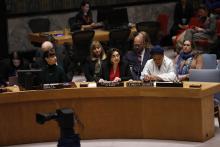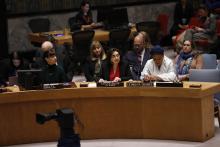In fact, that 20th anniversary was not a celebration, but a wake-up call.
We warned that the effects of ignoring our own commitments to women, peace and security would be long-lasting and inter-generational for women, and immediate and drastic for world peace.
We were right to worry, as at the Security Council meeting marking the 20th anniversary, two and a half years ago, the Security Council heard from an Afghan woman representing civil society, Zarqa Yaftali. She was proud to be the tenth Afghan woman to be invited to speak to the Security Council. Like most of those who preceded her, she asked that women’s rights should not be bargained away to reach a deal with the Taliban. And she expressed the regret that women had been excluded from 80 per cent of peace negotiations from 2005 to 2020, including the talks between the United States and the Taliban. A few months later, Zarqa’s worst fears materialized and the Taliban took control of her country once again.
I visited Afghanistan with the Deputy Secretary-General only a few weeks ago. Since then, the Taliban have announced more restrictions and detained more activists, including women’s rights defender Narges Sadat and Ismail Meshaal, a university professor who bravely showed his solidarity with Afghan women and their right to education.
As tomorrow you will hold yet another meeting on Afghanistan, I ask you to speak and act forcefully against this gender apartheid and find ways to support Afghan women and girls in their darkest moment.
Afghanistan is one of the most extreme examples of regression in women’s rights, but it is far from being the only one.
Only five days after the Security Council met to mark the 20th anniversary of resolution 1325, fighting broke out in Ethiopia’s northern region of Tigray. When a peace deal was signed two years later, some estimated the death toll to be in the hundreds of thousands.
We may never know the number of women and girls who were raped, but the International Commission of Human Rights Experts on Ethiopia said that sexual violence had been committed at a staggering scale. Child marriage increased by 51 per cent in one year of conflict. And local health centres, aid organizations, and human rights groups continue to report cases of sexual violence.
Since the 20th anniversary, there have been several military coups in conflict-affected countries, from the Sahel and Sudan to Myanmar, dramatically shrinking the civic space for women’s organizations and activists, if not altogether closing it.
According to a recent study, for example, politically motivated online abuse about women from and in Myanmar increased at least fivefold in the aftermath of the military coup in February 2021. This mainly takes the form of sexualized threats and the release of home addresses, contact details, and personal photos or videos of women who had commented positively on groups opposing military rule in Myanmar.
Yesterday, the Commission on the Status of Women began its annual session, with the priority theme dedicated to innovation and technological change. As my examples so far have demonstrated, the status of women is under siege. Aspects of technology, such as social media, have roles in sharing vital information and rallying support – and also in causing further harm through spreading disinformation and fostering violent misogyny.
It is critical that governments and private companies work together to foster technology as an enabler and accelerator of progress.
We also just passed the one-year mark since the start of the invasion of Ukraine and the largest refugee crisis in Europe since World War Two.
Women and their children are 90 per cent of the nearly 8 million Ukrainians that have been forced to move to other countries.
Similarly, women and girls are 68 per cent of the millions displaced within Ukraine. Peace is the only answer, with women’s engagement in the process.
Back in 2020, in a world wracked by a new pandemic that showed the enormous value of caregivers and the importance of investing in health, education, food security, and social protection, we had hoped that countries would heed the lessons from decades of activism by women peacebuilders and rethink military spending.
Instead, that spending has continued to grow, passing the two-trillion-dollar mark, even without the significant military expenditure of the last months. Neither the pandemic nor supply-chain issues prevented another year of rising global arms sales.
As we meet today at the mid-point between the 20th and 25th anniversaries, on the eve of International Women’s Day, it is obvious that we need a radical change of direction.
The concept note for this meeting asks you for your plans between now and 2025 and I will close with two suggestions about what that change of direction could look like.
First, we cannot expect 2025 to be any different if the bulk of our interventions continue to be trainings, sensitization, guidance, capacity building, setting up networks, and holding one event after another to talk about women’s participation, rather than mandating it in every meeting and decision-making process in which we have authority.
I ask that your plans be remarkable for their special measures and accountability for their application: that they be characterized by mandates, conditions, quotas, funding earmarks, incentives, and consequences for non-compliance. To transform the way we do peace and security will take more than exhortations and consultations in the margins.
Second, we need to broaden our reach to get resources to those who most need them—and don’t have them. The best tool that we have in the United Nations to channel funds to women’s organizations in conflict-affected countries is the Women’s Peace and Humanitarian Fund.
This Fund has already funded more than 900 organizations since it was created in 2015, a third of them in the last year alone. I am especially proud that almost half of those organizations received funding from the UN for the first time and 90 per cent of them operate at the sub-national level.
We urgently need better ways to support civil society and social movements in these countries. That means being much more intentional about funding or engaging with new groups, and especially with young women.
Let me assure you that UN Women is ready to work with you in finding that change of direction and forging a new path forward.
I am grateful to the Government of Mozambique for convening us now to set new goals and make purposeful and effective plans, before it is too late.
I thank you.

